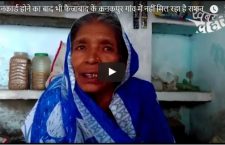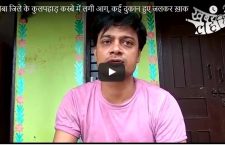There’s a reason we’re calling it a dhakosla – look it up, it’s a loaded word that rises above its English counterparts of farce, sham, tamasha, something intended to fool you, and encompasses all of it too – the woman pradhan figure of hinterland UP.
In 2015, we met Munni Devi in Banda who had won the ZilaParishad (ZP) elections from Mahua block – but when we say met, we mean we were face-to-face with just the idea of Munni Devi. It was her husband Gorelal who came along for the meeting, in the flesh. “What work do women have here?”, he questioned us, “I’m the one who does everything around here anyway.” Needless to add, nobody found it even the slightest bit strange that Gorelal had come along to pick up the papers certifying Munni Devi as the elected official. Or that he was now posing for photographs with janta. Upon asking around, we heard that Munni Devi was indeed last seen in these partsduring campaign time, but even of that, we can’t be too certain. We also met Geeta Singh in Niralanagar, Faizabad around the same time, who had also won the ZP elections by a good 77 votes, in fact. And this time, we actually met her – after practically hounding everyone in the village, all of whom claimed ignorance of her house address. A bit stunned, she told us she needs to find her husband for the interview we’re keen on, because he “handles media types”. Gradually Geeta warms up to us, but is constantly shushed by her mother-in-law asking her to wait for the man to arrive. We all eye each other angrily, nervously, as Geeta’s young daughter eyes us all, amused.
Cut to about a year later, in early 2016, we decided to go on yet another mahila pradhan walkabout in Faizabad – it was campaigning time, elections were around the corner, and our eyes were sore from having stared at gazillions of posters where the candidates’ husbands’ faces were eating up much of the real estate. They also swallowed whole much of our tete-a-tete time. From Rekha Yadav and Chaya Chaturvedi to Chandrawati Jaiswal and Gulabpati, all vying for the Bhikhapur’s pradhan post reserved for women, the pattern was so similar, we had to come up with an all-new term just to save our sanity.
We knew we had met the Pradhan Pati. All of them mouthing the same old, “Aakhir ladies hai,” as if they’d just told us that she’s suffering from a deadly disease.
The story isn’t all dire, of course. The numbers of women present in politics as increased, not just globally, but in India’s most populous state as well. They have been candidates at the state-level, some even running for the Assemble elections held in UP earlier this year. Sampat Pal, Commander-in-Chief (her preferred title), of the ubër popular Gulabi Gang contested from Manikpur in Chitrakoot, a hot seat of much electoral attention this year. Others like Kiran Verma who party-hopped from BSP to BJP in a bid to ride on the Dalit-pandering vote quota, didn’t manage to procure a “ticket”; neither did Rani Kanojia who once told us she’d slapped an official right across his face because he’d been acting fresh. “A tehsildar put his hand on my shoulder while I was talking to him, and I asked him to remove it. When he laughed and said, ‘Oh! Maybe I should put both my hands’, I slapped him. Hard. Twice.”
There are more names. Besides Munni Devi and Geeta Singh, 2015 also gave us Anshu Shivhare and Javitri Devi, both active contestants and campaigners for the panchayat elections. They couldn’t be more different – one a well-off Gupta, brought up in Kanpur and married into Mahoba rich and well-educated; the other a Chamar who had barely ever stepped outside her home, so much so that even her exam papers travelled to her marital home – and yet there was a palpable energy and will in both of them to engage, connect, and change status quo. Both of these candidates did not win. Neither did the other ‘wonder women’ above. Begs the question, does our patriarchal system bend progressive affirmative action legislation to suit the purpose of men holding the reins?
A few days ago, we got excited when he heard of not one, not two, but three women pradhans in just one block – Barabanki’sHaidergarh. No sooner than we had headed out to report, we were swept over with nausea and disappointment.
“Ma’am, what’s your name?”, we asked. A quick glance came as answer, directed to the man sitting by her side, who promptly said, “Her name is Mahejvi and my name is Mushir. I am her husband.” Mushir then went onto congratulate the “aarakshan” for women. Manju Devi informed us that it’s her “devar ji” who’s actually into “all this”. Why, we ask? Because it’s “baahar ka kaam”. Madhavi Devi insists that she will try to attend all the panchayat meetings if she gets the time, and lauds the support of her family, after spewing a well-learnt script on how backward her village is, and how girls need to be educated. What does she do all day that she’s unsure about time-management vis-à-vis her duties as an elected official, we ask? “Housework”, she says, nonchalant. Mahejvi is all praise for Mushir too, “We both do the work, I would say”, she says, after Mushir has left, “But he does it more than me, he can really connect with the people.” She seems so convinced you’d think it was an in-built knack in Mushir, which came along with his penis.
Of course, good can and will and should come out reservation for women. Maybe if the men just moved over, and the system focused on equipping the elected representatives to do their job, things would work a whole lot better. Things generally do with women in control.


